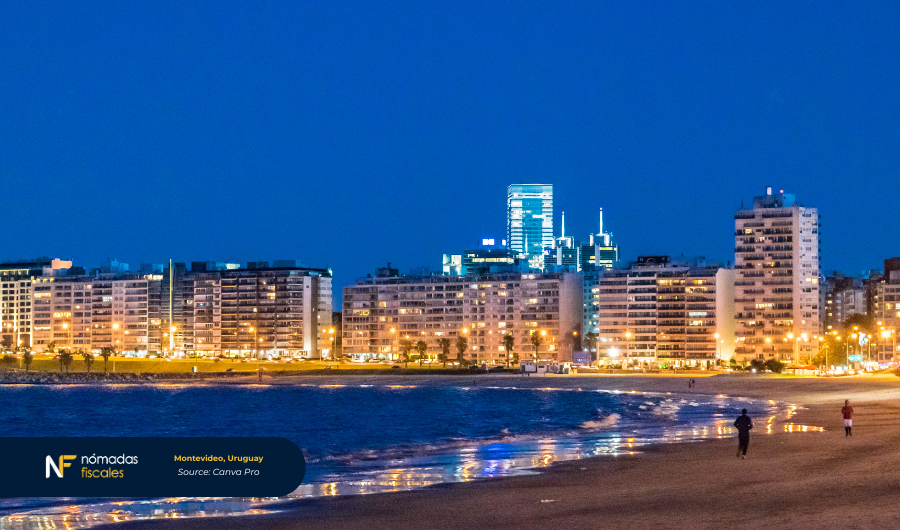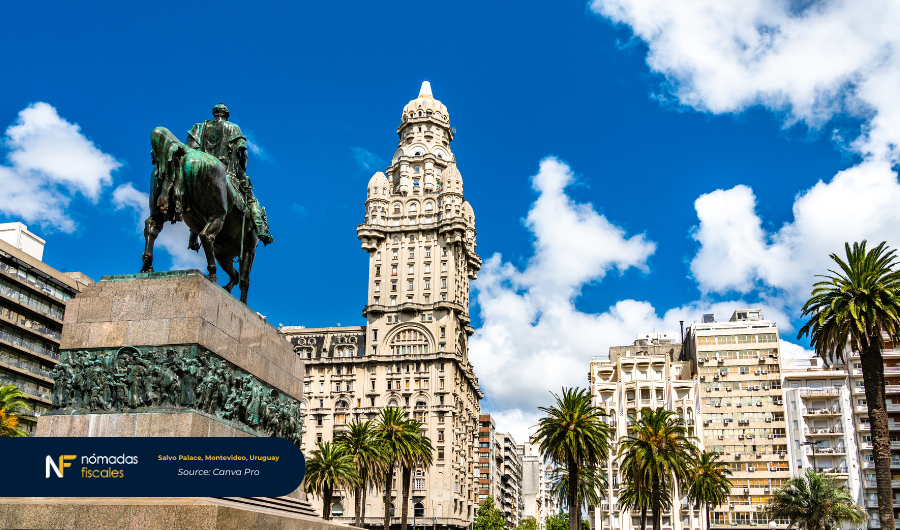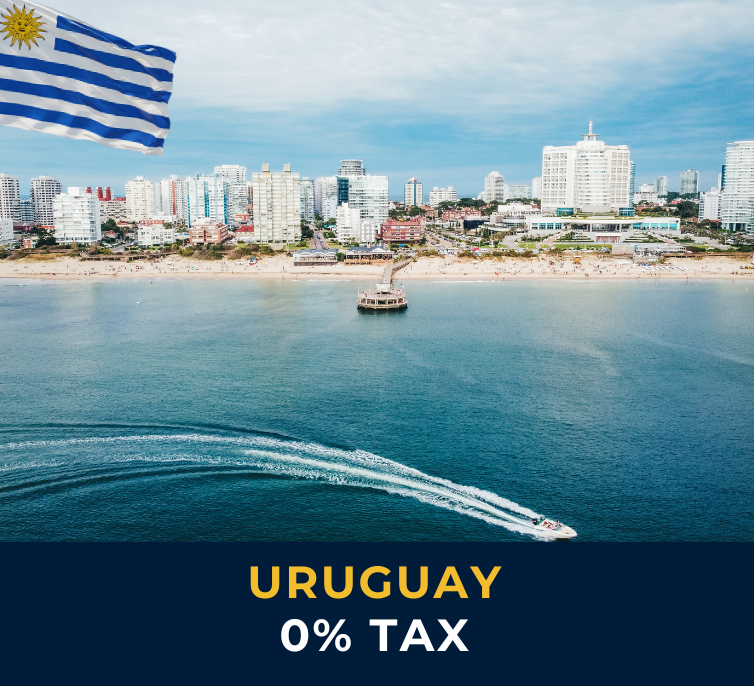Uruguay is a country that combines tradition, modernity, and quality of life like few others in the world. Internationally recognized for its mate, its asado, and for hosting the longest carnival on the planet, with more than 40 days of uninterrupted celebration, this small South American giant has much more to offer.
With an ideal climate year-round, winters in Uruguay are mild, especially along the coast, where temperatures rarely drop below 10°C, while summers are pleasant, with highs of 26-27°C. This welcoming environment is complemented by a population of just 3.5 million people, a stable political system, and a robust democracy, which is why it is known as “The Switzerland of South America.”
Unlike other countries in the region, Uruguay stands out for its strong middle class and more balanced economic distribution. With low crime rates compared to its neighbors, the country offers peace of mind to both its residents and those who decide to settle there.
Montevideo, the capital of the country, blends modernity with a rich cultural heritage. Meanwhile, Punta del Este, known as “the Monaco of South America,” is famous for its exclusivity, dream beaches, and a cosmopolitan atmosphere that makes it one of the most sought-after destinations in the region.
However, if you’ve made it this far, it’s likely that you’re interested in the tax opportunities that Uruguay has to offer, and we can tell you that they are many and very attractive.
First, for those looking to relocate their tax residence to a country that combines tranquility, quality of life, and an affordable cost of living, Uruguay offers a unique advantage: the possibility of benefiting from a territorial tax system for up to 11 years.
Secondly, Uruguay allows the establishment of companies with a 0% Corporate Tax rate, an exceptional opportunity for entrepreneurs and businesses who wish to operate in a fiscally competitive and stable environment.
Moreover, the country has one of the strongest passports in Latin America, offering visa-free access to 157 countries, further enhancing its appeal to those who value the freedom of movement. This advantage, combined with its political and economic stability, makes Uruguay an ideal destination for both settling and starting a business.
In this article, we will detail all the tax advantages that Uruguay offers, whether you’re looking for a new home or expanding your business vision in the Americas.
Tax Residency in Uruguay
To be considered a tax resident in Uruguay, you must meet one of the following requirements:
- Stay more than 183 days within a 12-month period.
- Have your center of economic or vital interests in Uruguay.
When counting the 183 days, occasional absences of up to 30 days will not be considered, so you could meet this requirement with as few as 140-150 days in the country. As for economic and vital interests, these can be demonstrated by having the base of your activities in Uruguay, enrolling a child in school in Uruguay, or obtaining health insurance, among other options.
If you do not want to meet the day-count requirement, there is also the option to invest USD 544,000 in Uruguay and reside only 60 days, thus obtaining tax residency through this alternative route, without having to stay 6 months in the country.
Lastly, there are also opportunities to obtain tax residency without spending a single day in Uruguay:
- Invest approximately USD 7,000,000 in companies engaged in activities considered of special interest to Uruguay.
- Invest around USD 2,332,000 in properties located in Uruguay or in a business that generates at least 15 new full-time jobs in the country.
These flexible tax residency options through investment allow you to finance the purchase through a mortgage and even start the process with a purchase agreement.
Additionally, the property does not need to remain vacant, as it can be rented out to third parties to generate income. In fact, with our guidance, you can invest in a property in Uruguay with an already existing rental demand.
Residence Permit in Uruguay
Obtaining residency in Uruguay is a relatively accessible process. Anyone interested in moving can apply, as long as they meet certain basic requirements, such as having a minimum monthly income of USD 1,500. This amount may vary depending on the number of dependents, and it is recommended to show more than USD 3,000 for a family of four members.
It is important to note that, unless opting for one of the flexible tax residency options with investment, Uruguay will require, from a migration perspective, spending at least 9 to 10 months in the country during the first year of temporary residency.
Once permanent residency is obtained, it will be necessary to visit Uruguay at least once every 365 days to keep the residency active.
In addition to these requirements, the procedures to establish residency in Uruguay are not exactly quick. They may take more than 6 months to complete, which could be an inconvenience for those seeking a faster process. If speed and flexibility are priorities, other options like Paraguay or Panama (with the right contacts and following our advice) might be more convenient choices.
Lastly, Uruguay has recently launched a digital nomad visa, which allows remote workers and entrepreneurs to obtain temporary residency to work in the country for up to 12 months, as long as they can prove they can financially support themselves.

How to Live Tax-Free in Uruguay (0%)
One of the main tax advantages of Uruguay is its territorial system, which allows tax residents to be exempt from paying taxes on capital gains, rental income, and pensions generated outside the country. This benefit makes Uruguay an attractive destination for those seeking tax residency with a favorable tax regime. However, income from movable capital, such as dividends and interest, is subject to a standard taxation rate of 12%.
The real advantage arises when you become a new tax resident of Uruguay, as you can choose between two tax options that allow for a significantly lower tax burden:
Territoriality for 11 years: This is the most popular option and allows you to enjoy a territorial regime on dividends and interest for the first 11 years of tax residency. In other words, you wouldn’t pay taxes on income generated outside of Uruguay during this time. After this 11-year period, you would begin to pay taxes at the standard rate of 12%.
Reduced tax rate of 7% permanently: If you prefer a long-term option, you can choose permanent taxation at a rate of 7% on dividends and interest, allowing you to pay much less than the standard 12% rate throughout your tax residency in Uruguay.
In addition to these advantages, Uruguay does not have inheritance, donation, or exit taxes, something we consider essential in a country that wants to distinguish itself from the tax hells that tax nomads are fleeing from.
Regarding cryptocurrency assets, Uruguay has started regulating them but does not have specific tax laws for cryptocurrencies. In practice, taxation is based on the location of these assets. If the sale of cryptocurrencies occurs outside of Uruguay, the gains from the transaction are completely exempt from taxes thanks to the country’s territorial tax system.
On the downside, Uruguay does apply a wealth tax, but at a very low rate of between 0.1% and 0.2%, and only on assets located in Uruguay that exceed a certain value.
Optimize Your International Tax Strategy in Uruguay
Although Uruguay does not apply the Controlled Foreign Corporation (CFC) rules, which affect foreign companies controlled by tax residents, there is a list of countries considered to have Low or No Taxation (BONT), which the Uruguayan government updates periodically. Tax residents who receive income from companies located in these countries may face additional taxation, so it is important to stay informed about this list and the potential tax implications.
On the other hand, although Uruguay does not have effective management rules (which is common in other countries), it does have permanent establishment rules. This means that if you have an international business structure, it is essential to evaluate whether it meets Uruguay’s requirements before taking the step to become a tax resident.

Tax-Free Companies in Uruguay (0%)
Although at first glance, Uruguay’s tax system may seem to apply a 25% tax rate on business income, there are very attractive options that allow companies to be taxed at 0% in certain contexts, making it a favorable destination for investment.
The Free Trade Zone Regime in Uruguay
Free Trade Zones (ZFs) are specific geographic areas within the country that have a special tax regime, allowing companies operating from these enclaves to enjoy a complete tax exemption. This includes full exemption from national taxes, except for employee social security contributions.
Uruguay has 11 strategically located Free Trade Zones throughout the country, near airports, ports, inland areas, and financial district zones. Companies that set up operations in these areas can work across a wide range of sectors, including:
- Logistics: Warehousing, classification, and handling of goods.
- Services: Financial, trading, information technology (IT), business process outsourcing (BPO), and shared services.
- Manufacturing: Specific industrial activities.
The tax exemption is permanent for companies operating within these zones, making them an extremely attractive option for those seeking to optimize their tax burdens.
Requirements for Free Trade Zones
The main requirement to operate in a Free Trade Zone is to have office space in one of these areas and employ at least one local Uruguayan worker. This condition ensures that companies maintain a minimal local presence.
Simplified Stock Companies (SAS)
In addition to Free Trade Zones, another advantageous corporate vehicle in Uruguay is the Simplified Stock Company (SAS). This corporate model is ideal for small businesses, as it offers a fast and low-cost incorporation process.
SAS companies benefit from a flexible tax regime with gross sales taxes ranging from 3% to 18%, up to an annual limit of approximately USD 550,000. This regime makes it easier to manage small businesses, allowing for a simple structure and favorable taxation, making it an excellent option for entrepreneurs.
Exemptions and Additional Benefits
In addition to the advantages of Free Trade Zones and SAS, Uruguay offers numerous tax exemptions for specific sectors and industries. Among them is an exemption regime for patents, which benefits technology and innovative companies, as well as industrial activities that develop high-value-added products or processes.

How to Obtain Uruguayan Citizenship and Passport
The Uruguayan passport is considered one of the most powerful in Latin America, providing visa-free access to 157 countries, including destinations in Europe, Asia, and North America. This is due to agreements such as the visa-free agreement with the European Union and participation in the MERCOSUR program, which facilitate international mobility.
One of the greatest advantages of Uruguayan citizenship is the ability to maintain dual nationality, offering great flexibility for those with family or professional ties in more than one country. Uruguay recognizes and allows dual nationality, making it an attractive option for those who wish to strengthen their passport portfolio.
The process of obtaining Uruguayan citizenship varies depending on the applicant’s personal situation. In general, a continuous legal residency period is required:
- 3 years for those with direct family ties to Uruguay, such as a spouse or Uruguayan children (it is not necessary to be married to a Uruguayan citizen).
- 5 years for those without these ties, as long as they can demonstrate strong connections to the country.
To obtain citizenship, applicants must have resided in Uruguay for at least 6 months per year during the required residency period and must also demonstrate significant integration into the social, cultural, and economic life of the country.
Pros and Cons of Tax Residency in Uruguay
Pros
Favorable tax regime for foreigners: For a period of up to 11 years, new tax residents can benefit from a territorial tax system, where only income generated within the country is taxed. After this period, taxation remains moderate and non-confiscatory. Additionally, there is the option to choose a reduced rate of 7% on foreign-sourced interest and dividends permanently.
Free Trade Zones with 0% taxes: Uruguay offers exceptional tax incentives for companies operating in Free Trade Zones, allowing them to operate completely tax-exempt, as long as they meet the requirements set by the regulations.
Tax advantage for small businesses: Small businesses can be set up as Simplified Stock Companies (SAS), a corporate model known for its quick and low-cost incorporation. These companies enjoy a flexible tax regime, with gross sales taxes ranging from 3% to 18%, up to an approximate annual limit of USD 550,000.
Stable political and economic environment: Uruguay is recognized for its institutional solidity, being one of the most consolidated and stable democracies in Latin America. Its legal framework protects private property and provides legal security, fostering trust among foreign investors.
Climate and quality of life: With a temperate climate, low crime rates compared to other countries in the region, and a relaxed environment, Uruguay offers an excellent quality of life. It is an ideal place for those seeking stability and well-being.
Ease of obtaining citizenship: The processes for acquiring Uruguayan citizenship are accessible and allow for the retention of dual nationality, making it an especially attractive option for those looking to diversify their passport portfolio and establish a solid backup plan.
Use of the US dollar: Although the official currency is the Uruguayan peso (UYU), the US dollar is widely accepted in sectors such as real estate, tourism, and commerce, making transactions easier for foreign investors.
Solid financial system: Uruguay has a well-regulated and modern banking system. Banks offer services such as dollar accounts, competitive international transfers, international cards, and digital solutions. Additionally, Uruguayan tax residents have good access to global financial services.
Healthcare system: Uruguay stands out for its strong healthcare system, which combines high-quality public and private options. The public system, managed through the National Health Fund (FONASA), ensures affordable care for all residents. On the other hand, the private system, especially the mutualist model, offers an excellent balance between cost and quality, with access to modern hospitals, trained specialists, and comprehensive medical services.
Networking and international communities: Montevideo and Punta del Este are emerging hubs for entrepreneurs, digital nomads, and investors. The expat community, particularly from Argentina, Europe, and the United States, is growing.
Affordable labor force: While Uruguay is not the country with the cheapest labor in the region, compared to Europe and other more developed economies, labor costs in the country are considerably lower. With a minimum wage of just over USD 500 per month at the time of writing, hiring employees in Uruguay is much more affordable than in many European countries.
Cons
High cost of living: Although Uruguay offers a high quality of life, the cost of living in cities like Montevideo and Punta del Este is higher than the regional average. Housing prices, services, private education, and imported products place it closer to the cost level of some European cities than the typical low cost of other South American countries.
Variable climate: While generally pleasant, the southern and inland regions of the country can experience cold and damp winters, which can be uncomfortable for some.
Limited air connectivity: Although Uruguay has two international airports, Carrasco Airport in Montevideo and Laguna del Sauce Airport in Punta del Este, direct flight options outside of South America are limited. Intercontinental flights usually require connections through hubs like Buenos Aires or São Paulo.
Bureaucracy in administrative processes: Although Uruguay’s legal system is solid, certain procedures can be slow and cumbersome, which may be frustrating for foreigners unfamiliar with the process. Therefore, seeking expert advice is key to successfully establishing residence or a business in the country.
Official language: While the official language of Uruguay is Spanish, which facilitates integration for Spanish speakers, those who do not speak the language may encounter significant barriers. English, while moderately widespread in tourism, business sectors, and some educational institutions, is not as common outside major urban areas like Montevideo and Punta del Este. However, Uruguay ranks in the top 5 Latin American countries for English proficiency and at the global average according to the English Proficiency Index by Education First, reflecting a relatively high level of language knowledge compared to other countries in the region.
Uruguay Residency and Companies Review
In conclusion, Uruguay stands out as one of the best options for tax nomads seeking tax residency and a well-structured international tax strategy. The country offers a quality of life comparable to many Western nations, with high-quality services and solid infrastructure, all at a moderate cost of living. The most attractive aspect of Uruguay is the possibility of living virtually tax-free. While this cannot remain at 0% indefinitely, it allows individuals to enjoy an extremely low lifetime tax rate with proper tax planning.
Uruguay’s numerous tax exemptions, covering a wide range of sectors, provide significant flexibility to accommodate different situations and needs, making it possible for everyone to find a way to benefit from them.
The process of obtaining citizenship is accessible, further enhancing Uruguay’s appeal as a destination for those seeking a second nationality in a country with solid political and economic stability.
From a business perspective, Uruguay is also an excellent choice. Its companies enjoy a strong reputation and can benefit from an extremely favorable tax regime through Free Trade Zones, with total tax exemptions, and other structures that enable operations with minimal fiscal burdens.
Compared to other residency and business destinations in Latin America, Uruguay competes with countries like Panama, Costa Rica, the Dominican Republic, Paraguay, or El Salvador.
As a critique, we would love to see Uruguay offer a more accessible and flexible tax residency certificate, similar to that of Paraguay, especially for tax nomads who do not wish to reside more than six months a year in a single country.
However, this option is already available for those willing to invest in Uruguay, whether through the 60-day stay modality or even with just one day of physical presence per year. This alternative allows those genuinely interested in obtaining residency without committing to prolonged stays to consider making the necessary investment and benefiting from this status while maintaining their mobility freedom.
Are you interested in obtaining residency, citizenship or setting up a company in Uruguay?
Or would you prefer a complete analysis of your situation to discover the best option for you?
In either case, we can help!
Simply request your FREE INITIAL CONSULTATION BY CLICKING HERE, or contact us directly via WhatsApp or through the form below.
Contact us
- 183 days: Stay for more than 183 days within 12 months (with occasional absences of up to 30 days).
- Economic/vital interests: Establish a base of activity in Uruguay, enroll children in school, or obtain local health insurance.
- Investments:
- $544,000 USD + 60 days of residence.
- $7,000,000 USD in key companies (no residency required).
- $2,332,000 USD in properties or companies creating 15 jobs (no residency required).
You can:
- Stay more than 183 days within 12 months (including up to 30 days of absences).
- Stay only 60 days if you invest at least 544,000 USD.
- Spend no time in Uruguay if you invest 7,000,000 USD in strategic activities or 2,332,000 USD in properties or businesses that create jobs.
It is a system where only income generated within Uruguay is taxed, while income earned abroad is exempt.
There are no taxes on cryptocurrencies if the profits are generated outside Uruguay. If the transactions take place within the country, they may be subject to taxation.
Uruguay has a territorial tax system, meaning that tax residents do not pay taxes on income, capital gains, rental income, or pensions generated outside the country. However:
- Dividends and interests: Taxed at 12%, unless you choose:
- Exemption for 11 years on foreign income.
- A reduced rate of 7% permanently.
Additionally:
- There are no taxes on inheritances, donations, or exit tax.
- Cryptographic assets sold outside of Uruguay are exempt.
- There is a wealth tax of between 0.1% and 0.2%, only on local assets exceeding certain values.
Free Zones in Uruguay are areas with a special tax regime that allows businesses to operate with a total exemption from national taxes. There are 11 zones for multiple activities such as logistics, services, and manufacturing.
The fundamental requirement is to rent an office in a free zone and hire at least one local employee.
- Reside in Uruguay for 5 years (3 years if you have Uruguayan family or are married, regardless of the spouse’s nationality).
- Submit a formal application and demonstrate integration into the country.
Yes, Uruguay allows and recognizes dual nationality.
Yes. Uruguay offers high-quality internet, economic stability, a good quality of life, and attractive tax advantages for foreign income.

